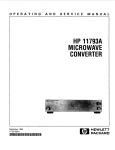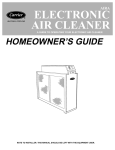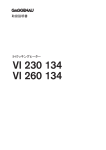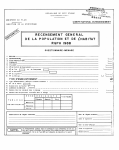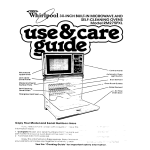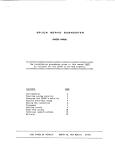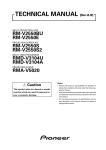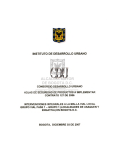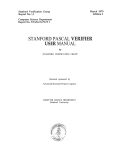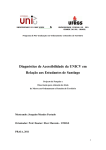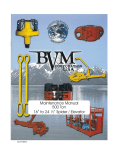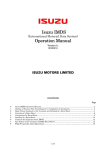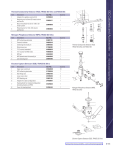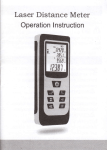Download -XQH Dear Customer, As of November 1, 1999, four of
Transcript
$JLOHQW7HFKQRORJLHV,QF ZZZDJLOHQWFRP (0LVVLRQ /LEHUW\/DNH:$ -XQH Dear Customer, As of November 1, 1999, four of Hewlett-Packard’s businesses, test and measurement, semiconductor products, health care solutions, and chemical analysis became a new company, Agilent Technologies. Now, many of your Hewlett-Packard products and services are in the care of Agilent Technologies. At Agilent Technologies, we are working diligently to make this transition as smooth as possible for you. However, as a result of this transition, the products and related documentation contained in this shipment may be labeled with either the Hewlett-Packard name and logo, the Agilent Technologies name and logo, or a combination of both. Information in this package may refer to Hewlett-Packard (HP), but applies to your Agilent Technologies product. Hewlett-Packard and Agilent branded products with the same model number are interchangeable. Whatever logo you see, the information, products, and services come from the same reliable source. If you have questions about Agilent Technologies products and services, please visit our website at http://www.agilent.com. 6LQFHUHO\ 5HEUDQGLQJ7HDP O P E R A T I N G A N D S E R V I C E M A N U A L HP 11793A MIC R 0WAVE CONVERTER September 1990 11793-90011 111111111111111111111111111111111111111111111111111111111111l1l11 HEWLETT PACKARD CERTlFlCATlON Hewlett-Packard Company certifies that this product met its published specifications ut the time of shipment from the factory. Hewlett-Packard further certifies that its calibration measurements are traceable to the United States National Bureau of Standards, to the extent allowed by the Bureau’s calibration facility, and to the calibration facilities of other International Standards Organization members. WARRANTY This Hewlett-Packard instrument product is warranted against defects in material and workmanship for a period of one year from date of shipment. During the warranty period, Hewlett-Packard Company will at its option, either repair or replace products which prove to be defective. For warranty service or repair, this product must be returned to a service facility designated by HP. Buyer shall prepay shipping charges to HP and HP shall pay shipping charges to return the product to Buyer. However, Buyer shall pay all shipping charges, duties, and taxes for products returned to HP from another country. HP warrants that its software and firmware designated by HP for use with an instrument will execute its programming instructions when properly installed on that instrument. HP does not warrant that the operation of the instrument, or software, or firmware will be uninterrupted or error free. LIMITATION OF WARRANTY The foregoing warranty shall not apply to defects resulting from improper or inadequate maintenance by Buyer, Buyer-supplied software or interfacing, unauthorized modificationor misuse, operation outside of the environmental specifications for the product, or improper site preparation or maintenance. NO OTHER WARRANTY IS EXPRESSED OR IMPLIED. HP SPECIFICALLY DISCLAIMS THE IMPLIED WARRANTIES OF MERCHANTABILITY AND FITNESS FOR A PARTICULAR PURPOSE. EXCLUSIVE REMEDIES THE REMEDIES PROVIDED HEREIN ARE BUYERS SOLE AND EXCLUSIVE REMEDIES. HP SHALL NOT BE LIABLE FOR ANY DIRECT, INDIRECT, SPECIAL, INCIDENTAL, OR CONSEQUENTIAL DAMAGES, WHETHER BASED ON CONTRACT, TORT, OR ANY OTHER LEGAL THEORY. ASSISTANCE Product maintenance agreements and other customer assistance agreements are available for Hewlett-Packard products. For any assistance, contact your nearest Hewlett-Packard Sales and Service Office. Addresses are provided at the back of this manual. Agilent Technologies. Inc 24001 E Mission Liberty take, WA 99019 .'::is:. e , .*a*.. :: . . . www agilent corn Ag iIent TechnoIog ies Innovating the HP Way June 8,2000 Dear Customer, As of November 1, 1999, four of Hewlett-Packard's businesses, test and measurement, semiconductor products, health care solutions, and chemical analysis became a new company, Agilent Technologies. Now, many of your Hewlett-Packard products and services are in the care of Agilent Technologies. At Agilent Technologies, we are working diligently to make this transition as smooth as possible for you. However, as a result of this transition, the products and related documentation contained in this shipment may be labeled with either the Hewlett-Packard name and logo, the Agilent Technologies name and logo, or a combination of both. Information in this package may refer to Hewlett-Packard (HP), but applies to your Agilent Technologies product. Hewlett-Packard and Agilent branded products with the same model number are interchangeable. Whatever logo you see, the information, products, and services come from the same reliable source. If you have questions about Agilent Technologies products and services, please visit our website at httR://www.aqilent.com. Sincerely, Rebranding Team HP 11793A MICROWAVE CONVERTER SERIAL NUMBERS This manual applies directly to instruments with serial numbers prefixed 2520A. With changes described in Paragraph 31, this manal also applies to instruments with serial numbers prefixed 2407A. For additional important information about serial numbers, see INSTRUMENTS COVERED BY THIS MANUAL in Paragraph 4. First Edition OHEWLElT-PACKARD COMPANY 1985 EAST 24001 MISSION AVENUE, TAF C-34, SPOKANE, WASHINGTON, U.S.A., 99220 Operating and Service Manual Part No. 11793-90011 Microfiche Operating and Service Manual Part No. 11793-90012 Printed. MAY 1985 1 Regulatory Information (Updated March 1999) 1 Regulatory Information (Updated March 1999) Safety Considerations GENERAL This product and related documentation must be reviewed for familiarization with safety markings and instructions before operation. This product has been designed and tested in accordance with IEC Publication 1010, "Safety Requirements for Electronic Measuring Apparatus," and has been supplied in a safe condition. This instruction documentation contains information and warnings which must be followed by the user to ensure safe operation and to maintain the product in a safe condition. SAFETY EARTH GROUND A uninterruptible safety earth ground must be provided from the main power source to the product input wiring terminals, power cord, or supplied power cord set. A SAFETY SYMBOLS Indicates instrument damage can occur if indicated operating limits are exceeded. A Indicates hazardous voltages. 1- Indicates earth (ground) terminal WARNING CAUTION 2 A WARNING note denotes a hazard. It calls attention to a procedure, practice, or the like, which, if not correctly performed or adhered to, could result in personal injury. Do not proceed beyond a WARNING sign until the indicated conditions are fully understood and met. A CAUTION note denotes a hazard. It calls attention to a n operation procedure, practice, or the like, which, if not correctly performed or adhered to, could result in damage to or destruction of part or all of the product. Do not proceed beyond an CAUTION note until the indicated conditions are fully understood and met. Chapter 1 Regulatory Information (Updated March 1999) Safety Considerations for this Instrument WARNING This product is a Safety Class I instrument (provided with a protective earthing ground incorporated in the power cord). The mains plug shall only be inserted in a socket outlet provided with a protective earth contact. Any interruption of the protective conductor inside or outside of the product is likely to make the product dangerous. Intentional interruption is prohibited. Whenever it is likely that the protection has been impaired, the instrument must be made inoperative and be secured against any unintended operation. If this instrument is to be energized via an auto transformer (for voltage reduction), make sure the common terminal is connected to the earth terminal of the power source. If this product is not used as specified, the protection provided by the equipment could be impaired. This product must be used in a normal condition (in which all means for protection are intact) only. No operator serviceable parts in this product. Refer servicing to qualified personnel. To prevent electrical shock, do not remove covers. Servicing instructions are for use by qualified personnel only. To avoid electrical shock, do not perform any servicing unless you are qualified to do so. The opening of covers or removal of parts is likely to expose dangerous voltages. Disconnect the product from all voltage sources while it is being opened. The power cord is connected to internal capacitors that my remain live for 5 seconds after disconnecting the plug from its power supply. For Continued protection against fire hazard, replace the line fuse(s) only with 250 V fuse(s) or the same current rating and type (for example, normal blow or time delay). D o not use repaired fuses or short circuited fuseholders. Always use the three-prong ac power cord supplied with this product. Failure to ensure adequate earth grounding by not using this cord may cause product damage. This product is designed for use in Installation Category I1 and Pollution Degree 2 per IEC 1010 and IEC 664 respectively. FOR INDOOR USE ONLY. This product has autoranging line voltage input, be sure the supply voltage is within the specified range. 3 Regulatory information (Updated March 1999) To prevent electrical shock, disconnect instrument from mains (line) before cleaning. Use a dry cloth or one slightly dampened with water to clean the external case parts. Do not attempt to clean internally. Ventilation Requirements: When installing the product in a cabinet, the convection into and out of the product must not be restricted. The ambient temperature (outside the cabinet) must be less than the maximum operating temperature of the product by 4" C for every 100 watts dissipated in the cabinet. If the total power dissipated in the cabinet is greater than 800 watts, then forced convection must be used. Product Markings CE - the CE mark is a registered trademark of the European Community. A CE mark accompanied by a year indicated the year the design was proven. CSA - the CSA mark is a registered trademark of the Canadian Standards Association. 4 Chapter 1 Safety Considerations Model SAFETY CONSIDERATIONS GENERAL This product and related documentation must be reviewed before operation for familiarization with safety markings and instructions. This product is a Safety Class I instrument (provided with a protective earth terminal). BEFORE APPLYING POWER Verify that the product is set to match the available line voltage and the correct fuse is installed. SAFETY EARTH GROUND An uninterruptible safety earth ground must be provided from the main power source to the product input wiring terminals, power cord, or supplied power cord set. SAFETY SYMBOLS A Instruction manual symbol: the product will be marked with this symbol when it is necessary for the user to refer to the instruction manual (refer to Table of Contents). f- Indicates hazardous voltages. 1, Indicates earth (ground) terminal. The WARNING sign denotes a hazard. I t calls attention to a procedure, practice, or the like, which, if not correctly performed or adhered to, could result in personal injury. Do not proceed beyond a WARNING sign until the indicated conditions are fully understood and met. The CAUTION sign denotes a hazard. It calls attention to an operating procedure, practice, or the like, which, if not correctly performed or adhered to, could result in damage to or destruction of part or all of the product. Do not proceed beyond a CAUTION sign until the indicated conditions are fully understood and met. .. 11 I WARNING 1 Interrupting the protective (grounding) conductor (inside or outside the instrument) or disconnecting the protective earth terminal will cause a potential shock hazard that could result in personal injury. (Grounding one conductor of a two conductor outlet is not sufficientprotection). Whenever it is likely that the protection has been impaired, the instrument must be made inoperative and be secured against any unintended operation. If this instrument is to be energized via an autotransformer (for voltage reduction), make sure the common terminal is connected to the earth terminal of the power source. Servicing instructions are f o r use by service-trained personnel only. To avoid dangerous electric shock, do not perform any servicing unless qualified to do so. Adjustments described in the manual are performed with power supplied to the instrument while protective covers are removed. Energy available at many points may, if contacted, result in personal injury. Capacitors inside the instrument may still be charged even if the instrument has been disconnected from its source of supply. For continued protection against fire hazard, replace the line fuse(s) only with 250V fuse(s) of the same current rating and type (for example, normal blow, time delay, etc.). Do not use repaired fuses or short-circuited fuseholders. Model 11793A Microwave Converter MODEL 11793A IF INPUT CABLE (HP Part Number 11793-60006) FREQUENCY CONTROL CABLE (HP Part Number 8120-1838) -- LO INPUT CABLE (HP Part Number 11793-60009) LINE POWER CABLE Figure 1. HP Model I I 7 9 3 A Microwave Converter with Accessory Cables 0 Model 1 1793A 1. Microwave Converter GENERAL INFORMATION This Operating and Service Manual contains information about initial inspection, operation, performance tests, adjustments, troubleshooting and repair of the HP Model 1 1793A Microwave Converter. 2, Specifications The HP 1 1793A Microwave Converter does not have "hard specifications" against which the instrument can be tested for performance standards or limits. Instead, the Local Oscillator (LO) Requirements are listed in Table 1. These requirements are the performance standards or limits against which the instrument can be tested. The supplemental characteristics listed in Table 2 are not warranted requirements but are typical characteristics included as additional information for the user. LO Amplitude Range Frequency (GHz) Conditions +8 dBm to +13 dBm 2 to 18 Without Option 001, 011 or 021 $7 dBm to +13 dBm 18 to 26.5 Without Option 001, 011 or 021 18 to 26.5 With Option 001, 011 or 021 0 dBm to +5 dBm Table 2. Supplemental Characteristics RF Input Connector: Precision 3.5 mm male LO Input Connector: Precision 3.5 mm male IF Output Connector: Type-N female Rear Panel Control Connector: BNC female Dimensions: Height: 88 mm (3.5 in.) Width: 425 mm (16.7 in.) Depth: 528 mm (20.8 in.) HP System II Module Size: Height: 88 mm (3.5 in.) Width: 1 Modular Width Depth: 508 mm (20 in.) 1 Microwave Converter 3. Model 11793A Safety Considerations This product is a Safety Class I instrument; that is, one provided with a prctective earth terminal. The Microwave Converter and all related documentation must be reviewed before operation for complete familiarization with safety markings and instructions. Refer to the Safety Considerations page found a t the beginning of this manual for a summary of the safety information. Safety information pertinent to the task a t hand (that is, installation, operation, performance testing, or service) is found throughout this manual. 4. Instruments Covered by This Manual This instrument has a two-part serial number. The first four digits and the letter comprise the serial number prefix. The prefix is the same for all identical instruments; it changes only when a change is made to the instrument. The last five digits form a sequential suffix which is unique to each instrument. The contents of this manual apply directly to instruments having the serial prefix listed under Serial Numbers on the title page. An instrument manufactured after the printing of this manual may have a serial prefix that is not listed on the title page. This unlisted serial prefix indicates that the manual for this instrument is supplied with a Manual Changes supplement that documents the differences. In addition to change information, the supplement may contain information for correcting errors in the manual. To keep this manual as current and accurate as possible, Hewlett-Packard recommends that you periodically request the latest Manual Changes supplement. The supplement is identified with the manual print date and part number that appear on the title page. Complimentary copies of the supplement are available on request from your nearest Hewlett-Packard office. For information concerning a serial prefix not listed on the title page or in the Manual Changes supplement, contact your nearest Hewlett-Packard office. 5. Description The HP Model 11793A Microwave Converter down-converts microwave input signals in the range from 1.3 to 26.5 GHz. For frequencies below 1.3 GHz, signals are routed directly to the input of the measuring instrument. Instruments suitable for lower frequency measuring are the HP 890 1B Modulation Analyzer or the HP 8902A Measuring Receiver. For input signals above 1.3 GHz, the Microwave Converter routes the signal through an internal mixer which mixes the input signal with an external local oscillator. The difference frequency (that is, the intermediate frequency or IF) is filtered, amplified, and then appears a t the IF OUTPUT connector. The IF should be between 10 and 700 MHz. The Microwave Converter requires a +8 dBm leveled output from the LO. For LOs with insufficient power above 18 GHz, an optional internal amplifier ( 1 8 GHz to 26.5 GHz) is available. The measuring instrument controls switching of the RF path and of the LO amplifier via a rear-panel connection on the Microwave Converter. 2 Model 11793A 6. Microwave Converter Options and Accessories Electrical Options The options are summarized in Table 3. The following list describes each option: Option 001. Adds an 18 to 26.5 GHz LO amplifier t o the standard instrument. Option 010. Moves the LO INPUT to the right side of the front panel. Option 011. Moves the LO INPUT to the right side of the front panel and adds the 18 to 26.5 GHz LO amplifier. Option 020. Moves all front-panel connectors to the rear panel. Option 021. Moves all front-panel connectors to the rear panel and adds the 18 to 26.5 GHz LO amplif ier. I Table 3. HP 11793A Option Guide LO Amplifier 1 Not installed installed Front-Panel Placement of LO Input Len Side Right Side I Rear Panel Placement for All Connectors Standard Option 010 Option 020 Option 001 Option 011 Option 021 Mechanical Options Instruments with Serial Prefix 2407A have System 11 cabinet parts and hardware that are English thread. Instruments with Serial Prefix 2520A and higher have System I1 cabinet parts and hardware that are METRIC thread. When ordering Option 907, 908, or 909 for instruments with serial number prefix 2407A (English thread), use the HP part number in parenthesis. Option 907 (Front-Handle Kit). Ease of handling is increased with front-panel handles. To retrofit a standard instrument, order HP part number 5061-9688 (5061-0088). Option 908 (Rack-Flange Kit). All necessary hardware and installation instructions are included t o enable mounting of the Microwave Converter in a rack with 482 mm (standard 19 in.) spacing. To retrofit a standard instrument, order HP part number 5061-9674 (5061-0074) which has standard 4.45 cm (1.75 in.) hole spacing. Option 909 (Rack-Flange and Front-Handle Combination Kit). This kit is not simply a front-handle kit and rack-flange kit packaged together. The combination is made up of unique parts which include both functions. To retrofit a standard instrument, order HP part number SO6 1-9675 (SO6 1-0075) which has 4.45 cm (1.75 in.) hole spacing and is a standard flange. Microwave Converter Option 907 Front Handle Kit Model 11793A Option 908 Rack Flange Kit Option 909 Rack Flange and Front Handle Combination Kit Figure 2. Rack Mounting Options Accessories Supplied The accessories supplied with the Microwave Converter are shown in Figure 1. a. The line power cable may be supplied in several plug configurations, depending on the destination of the original shipment. Refer to the Paragraph 12 "Power Cables" in this manual. b. Fuses with a 0.7SA rating for both 1 1 5 and 230 Vac (HP part number 21 10-0063) are supplied. C. The control cable ( HP part number 8 120- 18 38) is a 30 cm (1 2 in.) flexible cable with male BNC 50 ohm connectors on each end. It connects to the frequency offset mode output of the measuring instrument. d. The LO cable (HP part number 11793-60009) is a 36 cm (14.5 in.) flexible cable with 3.5 mm female end connectors. The LO cable includes a 3.5 mm male to Type-N male adapter. The cable connects to tlie output of the LO source. Options 001, 01 1, and 021 delete the adapter. e. The IF cable (HP part number 11793-60006) is a 25 cm (10 in.) flexible cable with Type-N male 50 ohm end connectors. The cable connects to the RF input of the measuring instrument. 4 Model 11793A 7. Microwave Converter Recommended Test Equipment Table 4 lists the test equipment recommended to check, adjust, and troubleshoot the Microwave Converter. The Minimum Specifications column describes the essential requirements for each piece of test equipment. If substitute equipment is used, it must meet or exceed the minimum specifications. Table 4. Recommended Test Equipment Instrument Type Minimum Specification Suggested Model Measuring Instrument Contains specific circuitry to control the HP 11793A. HP 8901B or HP 8902A' Sensor Module Must have a frequency range of 26.5 GHz and be compatible with the measuring instrument. HP 11792A' Microwave LO Source See LO Amplitude Range in Table 1, LO Requirements. Note that the required output power depends on the LO amplifier option in the HP 11793A. HP 86738" Microwave Signal Source Frequency Range: 2 to 26.5GHz Output Level: -1 to +1 dBm HP 86738 I [ Instrument Type Multimeter I RF Test Equipment 8. INSTALLATION 9. Initial inspection I To Troubleshoot the Microwave Converter I Minimum Specification DC DC AC AC Volts Volts Volts Volts Range: 1OOV Accuracy: 2% Range: lOOV Accuracy: 10% at 50 Hz Troubleshooting of the microwave components of the Microwave Converter requires measurements to 26.5GHz of gain or insertion loss, SWR, power, conversion loss, and frequency. Instruments which are required to perform these tasks include: signal generators and sweepers, network analyzers, spectrum analyzers, and power meters with accompanying couplers, pads, line stretchers, etc. Select the appropriate equipment and use standard test procedures to make these measurements. Inspect the shipping container for damage. If the shipping container or cushioning material is damaged, the shipping materials should be kept until the contents of the shipment have been checked for completeness and the instrument has been checked mechanically and electrically. If there is mechanical damage or if the instrument does not pass the performance tests, notify the nearest Hewlett -Packard office. Keep the damaged shipping materials (if any) for inspection by the carrier and a Hewlett-Packard representative. 5 Microwave Converter Model 1 1793A 10. Power Requirements The Microwave Converter requires a power source of 115, 230 Vac (+lo%,-20%),48 to 66 Hz. Power consumption is 20 VA maximum. 11. Line Voltage Selection Before the instrument is plugged in, it must De set to the voltage of the power source, or damage to the instrument may result. A line voltage switch enables selection of either 11SV or 230V. The line voltage is indicated on this rear-panel switch. Slide the switch to the proper line voltage for operation. 12. Power Cables BEFORE CONNECTING THIS INSTRUMENT, the protective earth terminal o f the instrument must be connected to the protective conductor of the (Mains) power cord. The Mains plug shall only be inserted in a socket outlet provided with a protective earth contact. The protective action must not be negated b y the use of an extension cord (power cable) without a protective conductor (grounding). Grounding one conductor o f a two-conductor outlet is not sufficient protection. This instrument is provided with a three-wire power cable. When connected to an appropriate ac power receptacle, this cable grounds the instrument cabinet. The type of power-cable plug shipped with the instrument depends on the country of destination. See Table 5 for part numbers of the available power cables and Mains plugs. 13. Mating Connectors All coaxial connectors (except the RF Input) used with the Microwave Converter are provided on the three accessory cables supplied with the instrument listed under Paragraph 6, I ' Accessories Supplied 'I. The RF Input connector should be of the APC 3.5 mm female SO ohm type. Refer to Table 2, Supplemental Characteristics for the correct type and location for mating each connector. Use the correct torque wrench when installing sub-miniature connectors. Tighten 3.5 mm connectors to 0.7 N.m (6.3 in.Eb). Tighten Type-N connectors to 0.7 N m (6.3 in.lb). 6 Model 1 1 7 9 3A Microwave Converter z!q Table 2-2. AC Power Cables Available I Number I I:".J 250V 0 I 8120-1351 8120-1703 0 4 I Cable Color 90 90 Mint Gray Mint Gray 79 87 Gray Gray Straight'CEE7-Y11 goo 79 79 Mint Gray Mint Gray East and West Europe, Saudi Arabia, Egypt, (unpolarized in many nations) 80 80 36 80 80 36 79 Black Black Black Jade Gray Jade Gray Jade Gray Gray United States, Canada, Mexico, Japan (1OOV or 200V), Philippines, Taiwan Straight'BS1363A 90" 0 250V 8120-1692 I Cable Length (inches) Plug Description 125V 250 V For Use In Country United Kingdom, Cyprus, Nigeria, Rhodesia, Singapore Austrailia, New Zealand 8120-1378 8120-1398 8120-1754 8120-1378 8120-1521 8120-1676 8120-2104 5 5 7 1 6 2 3 Straight'NEMA5-15P 90" Straight'NEMA5-15P Straight'NEMA5-l5P 90" Straight'NEMA5-15P Straight'SEVl 01 1 1959-24507 Type 12 8120-0698 6 Straight'NEMAG-15P 8120-1957 8120-2956 2 3 Straight'DHCK107 90" 79 79 Gray Gray Denmark 8120-4211 7 Straight'lEC83-B1 79 Black South Africa, India 8120-1860 6 Straight'CEE22-VI (Systems Cabinet Use) Switzerland ~~ I 250V United States, Canada 'Part number shown for plug is industry identifier for plug only. Number shown for cable is HP Part Number for complete cable including plug. E = Earth Ground; L = Line; N = Neutral 7 Microwave Converter Model 11793A 14. Operating Environment The operating environment should be within the following limitations: Temperature .......................... 0°C to +55"C Humidity .............................. ~ 9 5 relative % a t 40°C Altitude ............................... 44570 meters (1 5 000 feet) 15. Bench Operation The instrument cabinet has plastic feet which are shaped to insure self-alignment when stacked in a system configuration. 16. Rack Mounting Rack mounting information is provided with the rack mounting kits. If the kits were not ordered with the instrument as options, they may be ordered through the nearest Hewlett-Packard office. Refer to Paragraph 6, under "Mechanical Options" for kit information. See Figure 2, Rack Mounting Options. 17. Storage and Shipment The instrument should be stored in a clean, dry environment. The following environmental limitations apply to both storage and shipment. Temperature (Standard) ....................... - 5 5°C to +7 S"C Temperature (Options 001, 01 1, and 021) .... -25°C to +7S"C Humidity ...................................... 4 9 5% relative Altitude ....................................... 15 300 meters ( S O 000 feet) 18. Packaging Original Packaging. Containers and materials identical to those used in factory packaging are available through Hewlett -Packard offices. If the instrument is being returned to Hewlett -Packard for servicing; attach a tag indicating the type of service required, return address, model number, and full serial number. Also, mark the container FRAGILE to ensure careful handling. In any correspondence refer to the instrument by model number and full serial number. Other Packaging. The following general instructions should be used for repackaging the instrument with commercially available materials. a. Wrap the instrument in heavy paper or plastic. (If shipping to a Hewlett-Packard office or service center, attach a tag indicating the type of service required, return address, model number, and full serial number.) b. Use a strong shipping container. A double-wall carton made of 2.4 MPa (350 psi) test material is adequate. 8 Model 11 793A c. Microwave Converter Use enough shock-absorbing material; a 7.5 to 10.0 cm ( 3 to 4 in.) layer around all sides of the instrument to provide a firm cushion and to prevent movement in the container. Protect the front panel with cardboard. d. Seal the shipping container securely. e. Mark the shipping container FRAGILE to ensure careful handling. 19. Operation Before the Microwave Converter is plugged in, all protective earth terminals, extension cords, auto -transformers, and devices connected to it should be connected to a protective earth grounding socket. Any interruption of the protective earth grounding will cause a potential shock hazard that could result in personal injury. Before the Microwave Converter is plugged in, it must be set to the same line voltage as the power source or damage to the instrument may result. The HP 11793A Microwave Converter is designed to be operated remotely by the measuring instrument in its frequency offset mode. Operation of the Microwave Converter is, therefore, under control of the measuring instrument. 20. Operating Instructions To operate the Microwave Converter, plug in the power cord and connect the signal and control cables as indicated in Figure 3, Microwave Converter Interconnections and Test Set-up. Refer to Table 1, LO Requirements, for LO power requirements. This instrument does not have an orl/off switch or front-panel power indicator light. Power is supplied to the instrument as soon as the power cord is plugged in to the line voltage source. 9 Microwave Converter Model 11793A FREOUENCY OFFSET MODE INPUT I HP 6 9 0 2 A MEASURING RECEIVER FREPUENCY OFFSET TTL OUTPUT ::::: D00000 I 0 0 0 0 0 000000 0 0000 0 0 0000 0 0000 00000 Q RF INPUT SI II OR 1 I Figure 3. Microwave Convertor Interconnections and Typical T e s t S e t u p 21. Panel Features Front-panel features consist of the LO input, RF input, and the IF output connectors. For Options 020 and 021, the connectors are located on the rear panel. See Figure 4, Front-Panel F e a t u r e s for the standard locations of front-panel connectors. Rear-panel features are the Line Voltage Select Switch, Fuse, Power Cord and the Frequency Offset input connectors. See Figure 5, Rear -Panel Features. 22. Operator Checks Operator’s checks consist of insuring that a fuse of proper value is installed, that the power cord is plugged in, that the signal/control lines are connected, and that both the measuring instrument and the external LO are connected and turned on. 23. Operator Maintenance The only maintenance needed by the Microwave Converter is replacement of the primary power fuse. To replace the fuse, insert a standard screwdriver into the fuseholder and push in against the spring. Turn counterclockwise (while pushing with a slight pressure) until the fuseholder is released. Remove and replace the fuse with a new fuse of identical value. 10 Model 11793A Microwave Converter IF OUTPUT: The IF output, Type-N connector, couples the IF output signal into measuring instrument RF input. LO INPUT: The LO input, 3.5 mm connector, couples an external oscillator signal source to the instrument. RF INPUT: The RF input, 3.5mm connector couples the microwave input signal into the instrument. The maximum allowable input power is +30 dBm (lwatt), the input impedance is 50 ohms nominal. Figure 4. Front-Panel Features RF INPUT is a rear-panel input for the RF signal (instead of the standard front-panel connection) for option 020, 021 instruments. T IF OUTPUT is a rear-panel output for the IF signal (instead of the standard front-panel connection) for the option 020, 021 instruments. I LO INPUT is a rear-panel input for the LO signal (instead of the standard, front-panel connection) for the option 020, 021 instruments. FREQ OFFSET INPUT enables the measuring instrument to control the switching circuitry. T -1 LINE VOLTAGE SELECTION SWITCH: 115 or 230 Vac LINE VOLTAGE POWER CORD CONNECTION FUSE HOLDER AND .75A FUSE Figure 5. Rear -Panel Features 11 Model 1 1793A Microwave Converter 24. Performance Tests Description Performance testing consists of a general functional check to verify the instrument down-converts and switches RF paths properly. Since the Microwave Converter is designed to operate with specific HP instrumentation, no substitution is recommended. Equipment Measuring Instrument ................. HP 8901B or HP 8902A Sensor Module ......................... HP 1 17 9 2A Microwave LO Source .................See Table 4 Microwave Signal Source .............. HP 8673B (up to 26 GHz Amplifier) HP 8673B Option 008 (up to 26 GHz, (w/o Amplifier) HP 8672A Option 008 (up to 18 GHz, w/o Amplifier) RF Signal Source ...................... HP 8642B, HP 8660C/86602B, HP 8662A, HP 8663A Procedure 1. Connect the equipment as shown in Figure 3. Set the two microwave sources to CW. Set the microwave signal source to 0 dBm. NOTE Check that the measuring instrument's RF Power calibration factors match the sensor module. The measuring instrument must be in frequency offset mode in order to enter the RF Power calibration factors into the Frequency Offset mode RF Power Cal Factor Table. 2. Set the microwave LO source frequency and level as listed in Table 6. Performance Tests Znstrument Settings. For each setting, perform the following steps: a. Set the frequency of the microwave signal source as listed. b. On the measuring instrument, key in 27.3 SPCL. Key in the frequency of the microwave LO source (in MHz), then press the MHz key. c. On the measuring instrument, measure RF frequency and R F Power (in that order). The measuring instrument's display should read as indicated in table 6. (The listed frequency is a nominal value.) 3. Set the RF signal source to 1270 MHz. and level - 10 dBm. 4. On the measuring instrument, key in 27.3 SPCL and enter 0 MHz. This leaves the measuring instrument in frequency offset mode with 0 MHz offset. Measure RF Frequency and RF Power (in that order). 12 Model 11793A Microwave Converter Table 6. Performance Test Instrument Settings LO Source Frequency (MHz) 2 063 10 063 17 263 18 063 18 063 25 963'" 25 963"' I Signal Source I Measuring Instrument Display Level (dBm) Frequency (MHz) level (dBm) +8 +8 +8 0 ' 2 000 1 0 000 17 200 18 000 18 000 -1 5 -1 5 -1 5 -1 5 -15 2 000 10 000 17 200 18 000 18 000 25 900 25 900 -1 5 -15 25 900 25 900 I +8'* 0 ' +8" Frequency (MHz) 'Use this level only if the LO amplifier is installed (Option 001, 011 or 021). "Use this level only if the LO amplifier is not installed (Option 001. 011 or 021). "'Omit this step if maximum system frequency is 18 GHz. 25. Adjustments The only adjustment necessary is setting the +12V power supply. Connect a dc voltmeter to the case of VR3. (See Service Sheet 3.) Adjust A I R 5 on the AI Switch Control Assembly until the voltage is between +11.9 and + I 2 1 Vdc. 26. Replaceable Parts Table 7 lists all replaceable parts in alphanumeric order by reference designator. Table 8 contains the names and addresses that correspond to the manufacturer's code numbers. 27. Replaceable Parts List Table 7, Replaceable Parts. is organized as follows: a. Electrical assemblies and their components in alphanumeric order by reference designation. b. Chassis-mounted parts and mechanical parts in alphanumeric order by reference designation. The following information is provided for each part: a. The Hewlett-Packard part number. b. Part number check digit (CD). c. The total quantity (Qty) is provided on the first entry of the part number. d. The description of the part. e. A typical manufacturer of the part in a five-digit code. f. The manufacturer's number for the part. 13 Microwave Converter Model 1 1793A 28. Parts List Updating (Manual Changes Supplement) Production changes to the instrument made after the publication date of this manual are denoted by a change in the serial-number prefix. Changes to the parts list are recorded by serial prefix on a Manual Changes supplement. Also, errors in the manual are noted in the Errata portion of the Manual Changes supplement. 29. Illustrated Parts Breakdowns The components that compose the Microwave Converter are illustrated in the component locator diagrams in Figure 13, and in the illustrated parts breakdown photographs of Figures 7 and 8. 14 Model 1 1 7 9 3 A I Reference Designation HP Part Number 1 I A1 1 11793-6000: 4 RlCl R1C2 8 1 RlC3 RlC4 RlC5 0120-0197 0180-2302 1400-0249 0180-1794 0160-5098 0160-5098 0 3 6 3 A1C6 R1C7 R1C8 0160-5098 0160-4832 0160-5555 6 4 0 1 Mfr Code Description ItY R1 6 Replaceable Parts Table 7. Replaceable Parts SWITCH CONTROL RSSEMBLY 1 1 1 1 1 CRPRCITOR-FXD CRPRCITOR-FXO CRPRCITOR-FXD .22UF +-lo% 5CVDC CER . O l U F +-lo% lOOVDC CER .33UF +-5% lOOVOC Mfr Part Number 28480 11793-60001 56289 56289 06383 56289 16299 16299 150D225X9020R2 39D207G050FJS-DSB PLTlM-8 150D226X9035R2 CRC05X7R224J050R CRC05X7R224J050R 16299 28480 28480 CRC05X7R224J050R 0160-4832 1901-0028 1901-0028 1901-0050 1901-0050 1901-0050 0160-5555 DIODE-PWR RECT 400V DIODE-PUR RECT 4 0 0 V DIODE-SWITCHING 8OV DIODE-SWITCHING 8OV DIODE-SWITCHING 8OV 750MR 750MF) 200MR 200MA 200MR 00-29 DO-29 2NS 00-35 2NS DO-35 2NS DO-35 28420 28480 28480 28480 28480 DIODE-SWITCHING DIODE-SWITCHING DIODE-SWITCHING DIODE-SWITCHING 200MR ZOOMFI 200MA 200MA 2NS 2NS 2NS 2NS 00-35 00-35 00-35 DO-35 28480 28480 28480 28480 1901-00 5 0 1 9 0 1- 0 0 5 0 1901- 00 50 1901-0050 1 LED-LRMP LUM-INT=800UCD IF=30MR-MRX 28480 HLMP- 1 5 0 1 0 1 CONNECTOR 1 0 - P I N M POST T W E 28420 1251-5717 4 4 7 7 7 7 1 3L585 00000 04713 04713 04713 04713 2N4101 ORDER BY DESCRIPTION 2N2222fi 2N2222R 2N2222Q 2N2222A 0757-0821 0698-3442 0698-3442 0698-3442 2100-0568 8 9 9 9 1 1 3 28480 24546 24546 24546 28480 0757-0821 C4-1/8-TO-237R-F C4-1/8-TO-237R-F C4- 1/8-TO- 23 7R-F 2100-0568 RlR6 R1R7 R1R8 R1R9 RlRlO 0698-3150 0757-0984 0698-3150 0757-0438 0698-3150 6 24546 28480 24546 24546 24546 C4- 1/8-TO- 23 71-F 0757-0984 C4-1/8-TO-2371-F C4-1/8-TO-5111-F C4-1/8-TO-2371-F PlRll RlR12 R1R13 R1R14 RlR15 0757-0444 0698-3150 0698-3150 0698-3150 0698-3150 F TC=0+-100 F TC=0+-100 F TC=O+-100 F TC=0+-100 F TC=0+-100 24546 24546 24546 24546 24546 C4- 1/ 8-T 0 - 12 1 2 -F C4-1/8-TO-23 71-F C4-1/8-TO-2371-F C4-1/8-TO-2371-F C4-1/8-TO-2371-F RlR16 FllR17 RlR18 0698-3150 RESISTOR 2 . 3 7 K 1%.125W F TC=0+-100 RESISTOR 2 . 3 7 K 1%.125W F TC=0+-100 RESISTOR 2 . 3 7 K 1x .125W F TC=0+-100 24546 24546 24546 C4- 1/8-TO- 23 71-F C4-1/8-TO-2371-F ‘4-1/8-T0-2371-F RlUl 3826-0191 1820-1417 1820-1197 I C COMPQRRTOR GP DUQL TO-100 PKC I C GRTE T T L L S NRND QURD 2 - I N P I C GATE T I L LS NRND OUR0 2 - I N P 01295 01295 27014 Lfl319H SN7 4LS2 6N SN74LSOON RlVRl RlVR2 RlVR3 1902-3323 1902-0460 1826-0423 0340-0875 0515-0655 0535-0004 2190-0584 11793-0001 AlCRl RlCR2 RlCR3 RlCR4 R1CR5 1901-002 8 1901-0028 1901-0050 1901-0050 1901-0050 5 5 3 3 3 RlCR6 A1CR7 RlCR8 RlCRO 1 9 0 1- 0 0 5 0 1901-0050 1901-0050 1901-0050 3 3 RlDSl 1990-0717 6 RlJl 1251-5717 R1Q1 1884-0273 0515-0655 1 8 5 4 - 0477 1854-0477 1854-0477 1854-0477 R1Q2 R1Q3 RlQ4 RlQ5 RlRl R1R2 R1R3 R1R4 R1R5 RlU2 RlU3 RlVR4 0698-3150 0698-3150 1826-0367 2 7 3 3 8OV 8OV 8OV 8OV 4 1 RESISTOR 1 . 2 1 K 1% .5W RESISTOR 2 3 i - l % .125W RESISTOR 2 3 7 1%.125W RESISTOR 2 3 7 1%.125W RESISTOR-TRMR 1 0 0 1 0 % F F F F C TC=0+-100 TC=0+-100 TC=0+-100 TC=0+-100 TOP-RDJ 1-TRN 10 1 3 1 RESISTOR RESISTOR RESISTOR RESISTOR RESISTOR 2 . 3 7 K 1%.125W F TC=0+-100 1 0 1%.5W F TC=0+-100 2 . 3 7 K 1%.125W F TC=O*-100 5.11K 1%.125W F TC=0+-100 2 . 3 7 K 1%.125W F TC=0+-100 1 1 RESISTOR RESISTOR RESISTOR RESISTOR RESISTOR 12.1K 2.37K 2.37K 2.37K 2.37K 4 6 6 6 6 6 6 6 6 6 3 6 9 1 6 I ! I ( 1 1 1 1 1 1 1 4 2 2 1 5 1 - - 1%.125W 1x . l 2 5 W 1%.125W 1%,125W 1%.125W DIODE-ZNR 4 2 . 2 V 5% 0 0 - 3 5 PD=.4W T C = * . 0 8 X DIODE-ZNR 1 2 V 5% DO-35 PD=.4W TC=+.077% I C V RGLTR TO-3 INSULATOR-XSTR THRM-CNDCT SCREW-MACH M3 X 0 . 5 8MM-LG PRN-HD NUT-HFX DBL-CHRM M3 X 0.5 2.4MM-THK WASHER-Lk-HLtL 3 . 0 - MM 3.1-MM-ID HERT S I N K 28481 28481 04713 I C 78M05C V RGLTR TO-39 -. See introduction to this section for ordering information. 28480 28480 2701r 28481 0000l 00001 f MC78M05CG Indicates factory selected value 15 Model 11793A Replaceable Parts Table 7 . Replaceable Parts Reference Designation HP Part Number - 1 - 1 1 1 3 DB RTTENURTOR 1 1 1 0 3 1 2 9 1 2 17 1 22 3 9 5 11793-60003 6 F1 2110-0063 2110-0566 2110-0565 2110-0569 2190-0068 2 0 9 3 5 FL1 9135-0229 1400-0025 0515-0381 0535-0006 2190-0586 3050-0893 J1 08673-60040 J2 J3 J4 J5 J6 1 FIT 1 2190-0016 2950-0043 3 8 5 5 11793-60008 1 2 1250-0914 1250-0915 5040-0306 08671-2027 08555-20093 08555-20094 2190-0104 2950-0132 7 8 0 2 2 2 5 6 0 6 2 2 2 08673-60040 9 5 2190-0016 2 950- 0 043 3 8 08673-6004C 9 2190-0016 2950- 0043 3 8 08673-6004C 9 2190-0016 2950-0043 3 8 08673-6004C 9 2190-0016 3 J7 11793-60001 1 1250-0914 1250-0915 5040-0306 08671-2027 08555-2009: 08555-2009d 2190-0104 2950-0132 7 8 0 5 5 6 0 6 J8 1250-0870 4 2950-0043 6 1 A N D ABOVE MPZ 2 4 0 7 1 ONLY HP I MP2 FUSE . 7 5 A 250V NTD 1 . 2 5 X . 2 5 UL FUSEHOLDER-EXTR POST 12R 2 5 0 V FUSEHOLDER CAP 12R MRX FOR UL FUSEHOLDER COMPONENT NUT; THRERD M12.7 WASHER-LK I N T L T 1 / 2 I N , 5 0 5 - I N - I D 28480 28480 28480 28480 28480 2110-0063 2110-0566 2110-0565 2110-0569 2190-0068 FILTER-LOW PRSS DC TO 800MHZ; M/F SUR CLAMP-CRBLE . 5 - D I R .5-WD NYL SCREW-MRCH M4 X 0 . 7 10MM-LG PAN-HD NUT-HEX OBL-CHRM M4 X 0.7 3.2Mfl-THK WASHER-LK HLCL 4 . 0 MM 4 . 1 - M U - I D WRSHER-FL MTLC 4 . 0 MM 4.4-MM-ID 28480 28480 00000 00000 28480 28480 9135-0229 1400-0025 ORDER BY DESCRIPTION ORDER BY DESCRIPTION 2190-0586 3050-0893 CONNECTOR ASSEMBLY "LO INPUT" (LEFT S I D E : STRNDRRO ONLY) WASHER-LK I N T L T 3/8 I N , 3 7 7 - I N - I D NUT-HEX-DBL-CHRM 3/8- 32-THD . 0 9 4-IN-THK 28480 08673-60040 28480 00000 2190-0016 ORDER BY DESCRIPTION CONNECTOR ASSEMBLY TYPE-N " I F OUTPUT" _. (STRNDRRD AND OPTION 010 ONLY) CONNECTOR-RF RPC-N FEM UNMTD 50-OHM TONTFITT-RF CONN SER RPC-N FEMRLE 28480 11793-60008 28480 9D949 28480 28480 28480 28480 28480 00000 1250-0914 131-149 5040-0306 08671-2027 08555-20093 08555-20094 2190-0104 ORDER BY OESCRIPT I O N CONNECTOR QSSEMBLY "RF INPUT" (STANDARD AND OPTION 0 1 0 ONLY) WASHER-LK I N T L T 3 / 8 I N , 3 7 7 - I N - I D NUT-HEX-DBL-CHAM 3/8-32-THD . 0 9 4 - I N - T H K 2848C 08673-60040 2848C ooooc 2190-0016 ORDER BY DESCRIPTION CONNECTOR QSSEMBLY "LO I N P U T " (RIGHT S I D E : OPTION 0 1 0 ONLY) WASHER-LK I N T L T 3/8 I N . 3 7 7 - 1 N - I D NUT-HEX-DBL-CHAM 3/8-32-THD , 0 9 4 - I N - T H K 2848C 08673-60040 2848C ooooc 2190-0016 ORDER B Y DESCRIPTION CONNECTOR ASSEMBLY "RF I N P U T " (REAR PRNEL: OPTION 020 ONLY) WRSHER-LK I N T L T 3/8 I N , 3 7 7 - I N - I D NUT-HEX-DEL-CHRM 3/8-32-THD . 0 9 4 - I N - T H K 2848C 08673-60040 2848( OOOO( 2190-0016 ORDER BY DESCRIPTION CONNECTOR "LO I N P U T " - ASSEMBLY ___ (RERR PANEL: OPTION 020 ONLY) WASHER-LK I N T L T 3/8 I N , 3 7 7 - I N - I D NUT-HEX-DBL-CHRM 3/8-32-THD .094-IN-THK 2848( 08673-60040 2848( OOOO( 2190-0016 ORDER BY DESCRIPTION CONNECTOR ASSEMBLY TYPE-N " I F OUTPUT" (RERR PRNEL: OPTION 020 RND 0 2 1 ONLY) CONNECTOR-RF APC-N FEU UNMTD 50-OHM CONTACT-RF CONN SER RPC-N FEMRLE INSULRTOR INSULATOR CONTACT JRCK BODY, BULKHERO WASHER-LK I N T L T 7/16 I N , 4 3 9 - I N - I O NUT-HEX-DBL-CHRM 7/16-28-THD .094-IN-THb 2848( 11793-60008 2848( 9D94! 2848t 28481 28481 28481 28481 00001 1250-0914 131-149 5040-0306 0 8 6 7 1-2 027 08555-20093 08555-20094 2190-0104 ORDER BY DESCRIPTION CONNECTOR-RF BNC FEM SGL-HOLE-RR FREQUENCY OFFSET INPUT" 28481 1250-0870 BODY, BULKHERD WRSHER-LK I N T L T 7/16 I N . 4 3 9 - I N - I 0 NUT-HEX-DBL-CHRM 7/16-28-THD .094-IN-THK ~~ 5 021- 5 8 0 1 0515-1227 5021-5832 0515-1331 0 8 7 5 1 6 2 8 FRRME FRONT SCREW-MRCH M 3 X 0 . 5 Sflfl-LG 90-DEG-FLH-HD S I D E STRUT SCREW-MACH M4 X 0.7 6MM-LG FLRTHD 28480 00000 28480 00000 5020-8801 0515-1227 5020-8832 2510-0192 4 1 FRONT FRAME SCREW-MFICH M3 X 0 . 5 6MM-LG 90-DEG-FLH-HI SIDE STRUT SCREW-MACH 8-32 . 2 5 - I N - L G 1 0 0 DEG 28481 2848 28481 0000 8 1 6 - 6 2 8 See introduction to this section for ordering information. 16 50-OHM PART OF W12 (NOT SEPRRRTELY REPLRCERBLE PRRT OF W l O / W 1 1 (NOT SEPARRTELY REPLACEABLE) J10 MPI 11793-60003 __ __ 8 M f r P a r t Number 28480 2 J9 ZS2OA Mf r Eode Description QtY * Indicates 5021-5801 ORDER BY DESCRIPTION 5021-5832 ORDER BY DESCRIPTION 5020-8801 0515-1227 5020-8832 ORDER B Y DESCRIPTION factory selected value Replaceable Parts Model 11793A Table 7. Replaceable Parts Reference Designation 2401AOWLY HP P a r t Number 3 - RERR FRRME SCREW-MRCH M3 X 0 . 5 6MM-LG PAN-HD THREROEO INSERT-NUT M3X0.5 , 0 5 9 - I N - L G TOP TRIM STRIP S I D E TRIM 3 1 / 2 5020-8802 0515-0680 0590-1203 5040-7202 5001-0438 1 COVER, TOP COVER, SIDE RERR PRNEL RSSEMBLY 5061-9435 5061-9452 11793-20009 0 1 9 1 TOP COVER S I D E COVER RERR PRNEL 5060-9835 5060-9a5~ 11793-00004 11793-0000 2 11793-0001 11793-0000 0 FRONT DRESS PRNEL (EXCEPT OPTIONS 0 1 0 FIND 0 1 1 ) FRONT DRESS PRNEL (OPTIONS 0 1 0 RNO 0 1 1 ONLY) FRONT SUB-PANEL 11793-00005 1 1 5020-8802 0515-0680 0590-1203 5040-7202 5001-043a a 5 06 1-943 5 5061-9452 11793-20001 l 3 l MP6 MP1 MP8 5060-9a35 50.so-ga52 11793-0000 MP9 MP3 MP4 MP 5 2520.4 A W D A B O V E MP6 MPl MPB 2 1 0 7 1 OWLY MPlO 2 5 2 0 1 AWD ABOVE 5 a 9 7 1 12 1 2 1 1 2 1 1 1 5061-9447 1 BOTTOM COVER 5060-9847 1 1 3 FOOT FULL-l/2MOD MRIN DECK STANOOFF-1/4 TURN 6 . 3 5 MM LG: 1 0 . 1 6 MM SCREW-MRCH M4 X 0 . 7 10MM-LG PAN-HD WASHER-LK HLCL 4 . 0 MM 4.1-MM-ID NIXER HOUSING MD SCREW-MRCH M4 X 0 . 7 10MM-LG PAN-HO WgSHER-LK HLCL 4 . 0 MM 4.1-MM-IO R F I STRIP ( * ORDER QTY 2 F T ) 5040-7201 11793-00001 03ao-i705 ORDER BY DESCRIPTION 2190-05a6 11793-20005 ORDER BY DESCRIPTION 2190-05a6 8160-0472 RF COVER SCREW-MRCH M 4 X 0 . 7 10MM-LG PRN-HO WASHER-LK HLCL 4 . 0 MM 4.1-MM-IO RMPLIFIER BRACKET (OPTIONS 0 0 1 , 0 1 1 RND 0 2 0 ONLY) SCREW-MRCH M3 X 0.5 SMM-LG PRN-HD 11793-00002 ORDER BY DESCRIPTION MPll 5060-9847 4 MP12 NP13 5040-7201 11793-0000 03ao-i705 0515-0381 2190-0586 11793-2000 05i5-03ai 2i90-05a6 8160-0472 a 11793-0000 0515-0381 2190-05a6 11793-0001 9 3 1 3 1 05i5-06ao 5 11793-0000 0515-0373 0520-0130 2190-0045 2190-osa4 3050-009a 3050-0891 3050-0893 11793-0001 4 3 1 NP14 MP15 MP16 MP17 a 0 3 2 4 3 2 8 2 11793-00003 COVER. BOTTOM ? 2 4 0 1 4 ONLY 11793-00012 1 5061-9447 WPll M f r P a r t Number Description u 1 6 1 MIXER BRACKET SCREW-MACH M3 X 0.5 10MM-LG PRN-HO SCREW-MRCH 2-56 . 3 7 5 - I N - L G PRN-HO-PO21 HLCL NO. 2 . o a a - I N - I o MM 3.1-MM-ID HLCL 3 . 0 MTLC NO. 2 . 0 9 4 - I N - I 0 MM 3.3-MM-ID MTLC 3 . 0 MM 4.4-MM-IO MTLC 4.0 ERR 11793-0000 05i5-03ai 2i90-05a6 6960-0023 6960-0009 3 3 2 1 TRRNSFORMER BRRCKET 1 2 11793-200C 6 s1 11793-6001: 5 2 52 0515-0446 11793-6OOC 1 5 6 0515-0446 1 9100-4014 0515-1137 2igo-osa4 3050-0agi 7120-4559 7 9 0 7 MP19 NP20 MP21 MP22 MP2 3 NP24 MP25 T1 a 0 6 7 9 9 5 - 1 2 4 4 12 2 a 1 3 1 4 2 - NOT ASSIGNED NOT RSSIGNEO GRONNET, SEMI-RIGID CRBLE 11793-00014 0515-0680 11793-00007 ORDER BY DESCRIPTION ORDER BY DESCRIPTION 2190-0045 2190-0584 3050-009a 3050-0agi 3050-0a93 11793-00017 11793-00006 ORDER BY DESCRIPTION 2190-05a6 6960-0023 6960-0009 11793-20007 CORXIRL SWITCH (OPTIONS 0 0 1 , 0 1 1 AN0 0 2 1 ONLY) SCREW-MACH M3 X 0.5 22MM-LG PRN-HO CORXIRL SWITCH (EXCEPT OPTIONS 0 0 1 , 0 1 1 AND 0 2 1 ) SCREW-MRCH M3 X 0.5 22MM-LG PAN-HD TRRNSFORMER PWR 1 1 5 / 2 3 0 V SCREW-MRCH M3 X 0.5 50MM-LG PRN-HO WASHER-LK HLCL 3 . 0 MM 3.1-MM-ID WRSHER-FL MTLC 3 . 0 MM 3.3-MM-IO LABEL-WRRNING .S-IN-WO 1-IN-LG MYLRR See introduction to this section for ordering information. 2190-0586 11793-60002 0515-0446 11793-60002 0515-0446 9100-4014 0515- 1 1 3 7 2i90-05a4 3050-0891 * Indicates factory selected value 17 Replaceable Parts Table 7. Replaceable Parts Reference Designation u1 U2 u3 HP P a r t Number 3 7 0520-0130 0955-0237 0520-0133 2190-0045 2950-0132 1 0955-0217 0515-0680 2190-0584 3050-0891 6 5 0 7 0 4 8 1 11793-20002 1 w2 11793-20003 2 M f r P a r t Number RMPLIFIER-MICROWRVE FREQ RRNGE: l8GHZ TO (OPTIONS 001, 0 1 1 RND 0 2 1 ONLY) SCREW-MRCH 2-56 . 3 7 5 - I N - L G PRN-HO-PO21 MOD. SMR AMPLIFIER-RF __ __ SCREW-MRCH 2-56 . 5 - I N - L G PRN-HO-PO21 WRSHER-LK HLCL NO. 2 . 0 8 8 - I N - I 0 NUT-HEX-OBL-CHRM 7/16-28-THO ,094-IN-THK 28480 0955-0218 00000 28480 00000 28480 00000 ORDER BY DESCRIPTION 0955-0237 ORDER BY DESCRIPTION 2190-0045 ORDER BY DESCRIPTION 1 MIXER-MICROWFIVE FREQ RRNGE: LO: 2.0GHZ SCREW-MRCH M3 X 0 . 5 6MM-LG PRN-HO WRSHER-LK HLCL 3 . 0 nn 3.1-MM-IO WRSHER-FL MTLC 3 . 0 MM 3.3-MM-ID 28480 28480 28480 28480 0955-0217 0515-0680 2190-0584 3050-0891 1 LO INPUT CRBLE, SEMI-RIGID: J 1 TO U3 (STANORRO ONLY) I F OUTPUT CRBLE, SEMI-RIGID: J 2 TO S2 ISTRNORRO RNO OPTIONS 0 0 1 . 0 1 0 RNO 0 1 1 28480 117 93- 20002 28480 11793-20003 RF iNPUT CRBLE, SEMI-RIGIO: J 3 TO 52 (STRNORRD RND OPTIONS 0 0 1 , 0 1 0 FINO 0 1 1 ONLY) 28480 11793-20004 1 2 6 w1 Mf r Code Description I 0955-0218 Model 1 1793A 1 nNi v \ w3 11793-20004 3 1 w4 11793-20101 1 1 28480 11793-20101 w5 11793-20103 3 28480 11793-20103 W6 11793-20102 2 1 28480 11793-20102 w7 11793-60013 8 2 11793-60013 11793-60013 28480 11793-60013 w9 11793-20104 4 1 28480 11793-20104 w10 11793-60011 6 MIXER OUTPUT CRBLE RSSEMBLY, FLEX-CORX ( 9 1 2 ) : U3 TO F L 1 F : RMPLIFIER OUTPUT CABLE RSSEMBLY, 1 FLEX-CORX ( 9 1 2 ) : U2 TO S2 LO RMPLIFIER INPUT CRBLE, SEMI-RIGID: S1 TO U 1 (OPTIONS 001. 0 1 1 RND 0 2 1 ONLY) 28480 W8 1 11793- 60011 0515-1084 0535-0004 2190-0584 11793-60012 5 9 0 7 28480 00000 28480 28480 0515-1084 ORDER EY DESCRIPTION 2190-0584 11793-60012 11793-60007 0535-0004 2190-0584 11793-60010 1250-0952 1250-0958 1250-0960 1250-0964 1400-0025 2190-0102 2950-0035 0 9 0 5 3 9 3 1 MODULE HRRNESS RSSEMBLY (STRNORRO AN0 OPTIONS 0 1 0 RND 020 ONLY) SCREW-MACH M3 X 0 . 5 12MM-LG PRN-HO NUT-HEX OEL-CHRM M3 X 0.5 2.4MM-THK WRSHER-LK HLCL 3.0 nn 3.1-MM-ID MODULE HRRNESS RSSEMBLY (OPTIONS 0 0 1 , 011, AN0 0 2 1 ONLY) 28480 4 W14 11793-20106 6 1 W15 11793-20107 7 1 W16 11793-20108 8 1 W17 11793-20109 9 1 w11 w12 W13 W18 11793-20110 8 7 0 8 8 2 1 4 1 1 1 1 1 1 1 1 1 w19 11793-20111 3 1 w20 11793-60009 2 1 w21 11793-60006 9 w22 8120-1838 8 - 1 1 - MoouLE CRBLE, FLRT: ~ i TO~ ~9i NUT-HEX DBL-CHRM 113 X 0 . 5 2.4MM-THK WRSHER-LK HLCL 3 . 0 MM 3.1-MM-ID CRBLE RSSEMBLY. CORX: 3 8 TO R 1 COiVRCT-RF CONN BNC/TNC:FEM CTR BUSHING RF CONN BNC/TNC: FOR I N T L SLEEVE-RF CONN SER BNC/TNC NUT-RF CONN BNCITNC: cLRnP NUT FOR CLRMP-CRBLE . 5 - D I R .5-WD NYL WRSHER-LK I N T L T 1 5 / 3 2 I N . 4 7 2 - I N - I 0 NUT-HEX-DBL-CHAM 15/32-32-THO 28480 00000 28480 28480 24931 24931 28480 24931 28480 28480 00000 LO INPUT CABLE, SEMI-RIGID: J4 TO S1 (RIGHT SIDE: OPTION 0 1 1 ONLY) RF INPUT CRBLE, SEMI-RIGID: J 5 TO S1 (OPTIONS 020 AND 0 2 1 ONLY) I F OUTPUT CRBLE, S E M I - R I G I D : J 7 TO 5 2 (OPTIONS 020 RND 0 2 1 ONLY) 28480 11793-20106 28480 11793-20107 28480 11793-20108 LO INPUT CRBLE, SEMI-RIGID: 36 TO u 3 28480 11793-20109 28480 11793-20110 28480 11793-20111 28480 11793-60009 28480 11793-60006 2848C 8120-1838 (OPTION 020 ONLY) LO INPUT CRBLE, SEMI-RIGID: J6 TO s1 (OPTION 0 2 1 ONLY) LO INPUT CRBLE, SEMI-RIGID: J 4 TO u3 (RIGHT S I D E : OPTION 0 1 0 ONLY) LO INPUT CRBLE, FLEX: 35MM MRLE (ACCESSORY) F I OUTPUT CABLE. FLEX: SM MRLE (RCCESSORY) CRBLE RSSY-COAX 50-OHM 12-IN-LG (ACCESSORY) See introduction to this section for ordering information. 18 J GK 11793-60007 ORDER BY DESCRIPTION 2190-0584 11793-60010 C232-2 CS 105-3 1250-0960 N126-2 1400-0025 2190-0102 ORDER BY DESCRIPTION * Indicates factory selected value Model 1 1793A Microwave Converter Table 8. Code List of Manufacturers M fr Code Manufacturer Name ANY 6 A T I S F A C T O R Y S U P P L I E R TEXAS I N S T R I N C SEHICOND CBPNT D I U BOTOROLA SEBICONDUCTOR PRODUCTS P A N D U I T CORP CORNING GLASS UKS COHPONENT D I U CORNING GLASS WORKS (BRADFORD) S P E C I A L T Y CONNECTOR CO I N C NbTIONnL SEBICONDUCTOR CORP HEULETT-PACKARD CO CORPORATE HQ R C A CORP S O L I D STATE D I V SPRhCUE E L E C T R I C CO AHPWENOL S A L E S D I U OF BUNKER-RABO Address DALLAS PHOENIX T I N L E Y PARK RALEIGH BRADFOR D GREENWOOD SANTA CLARA PAL0 ALTO SOMERUILLE NORTH ADABS BROADUIEW TX A,? 11. NC PA IN CA CA NY HA IL Zip Code I 75222 85008 60477 27604 16701 46227 95051 94304 01247 60153 19 Model 11793A Microwave Converter MP8 \ \ \ 7P M MPlO MP12 NOTE: MP21 AND MP22 ARE HOLE PLUGS. Figure 6. Cabinet Parts 20 1 1 ,/ /MP9 Model 11793A Microwave Converter J1 \ W1 (Standard) W19 (Option 010) W17 (Option 020) MP25 \ u3 (Under MP18) MP18 MP25 W3 AT1 W2 MP25 J2 \ \ \ I l l / / / J3 52 MP14 w10 MPl5 (Gasket) J10 w7 W8 w12 u2 A1 MP13 W13 MP16 MP20 f11 T1 F1 Figure 7 . Illustrated Parts Breakdown for Standard and O p t i o n 010 21 Microwave Converter J1 (1 Dption 001 only) W4 (Option 001 only) J4 (I3ption 011 only) W14 (Option 011 only) J6 (I3ption 021 Model 1 1 793A W6 I u1 I MP18 / u3 (Under W3 / W2 / J2 / / 52 s1 / MP14 W8 ,w11 MP15 (Gasket) eJ11 ,w 7 A1 u2 MP13 f11 MP20MP16 W13’ T1 F1’ Figure 8. Illustrated Parts Breakdown for Options 001, and 0 I I 22 Model 11793A Microwave Converter 30. Ordering Information To order a part listed in the replaceable parts table, include the Hewlett-Packard part number (with the check digit) and the quantity required. Address your order to the nearest Hewlett-Packard office. The check digit will ensure accurate and timely processing of your order. To order a part that is not listed in the replaceable parts table, include the instrument model number, instrument serial number, description and function of the part, and the quantity of parts required. Address the order to the nearest Hewlett -Packard office. 31. Manual Changes These paragraphs contain manual change instructions for backdating this manual for HP Model Microwave Converters with the serial number prefix 2407A. 1793A Instruments with Serial Prefix 2407A have System I1 cabinet parts and hardware that are English thread. Instruments with Serial Prefix 2520A and higher have System I1 cabinet parts and hardware that are METRIC thread. In Table 7 . Replaceable P U Y ~ Sboth , English and Metric thread part numbers are listed for the System I1 cabinet parts. These correct part numbers are referenced under the instrument’s serial number prefix. Instruments with the serial number prefix 2407A have MP3 (rear frame), MP8 (rear panel), and associated english thread hardware, that are screwed together. These parts have been changed to a riveted, one piece assembly that is referenced to MP8. To replace MP8 you must order the Rear Panel Assembly 1 1793-20009, and the metric screws for the side struts and rear feet. 32. SERVICE 33. Principles of Operation Simplified Block Diagram A simplified block diagram of the Microwave Converter is shown in Figure 10. The signal a t the RF INPUT connector is routed through an input switch either to the Direct Path (and out the IF OUTPUT connector), or to the Down-Convert Path. The Down-Convert Path has a 3 dB RF Attenuator (to improve input SWR), a Mixer (tte down-converter), an IF Low-pass Filter (to remove the sum component of the mixing process while passing the difference component), and a + 1 S dB IF Amplifier (to restore signal loss through the Down-Convert Path). Usually, the LO frequency selected is higher than the frequency of the input signal. (The measuring instrument assumes this.) The difference frequency (the IF) is filtered by the IF Low-Pass Filter, which has a 3 dB corner of 800 MHz. The IF should be kept between the range of 10 and 700 MHz. If the instrument has the optional LO Amplifier installed, the measuring instrument automatically switches in the amplifier whenever an LO frequency greater than 18 GHz is selected. 23 Model 1 1793A Microwave Converter Service Sheets 1 and 2 (Input Signal Down-Converter) A single input on the rear panel: the FREQ OFFSET INPUT, has three logic states which control both the switching of the RF two paths, and the insertion of the optional LO Amplifier. The Level Comparator senses the three states and drives the appropriate switches. Service Sheets 1 and 2 are the schematic diagrams of the RF circuitry of the Microwave Converter. Service Sheet 1 (SS1) documents the standard Microwave Converter (without the LO Amplifier option), and Service Sheet 2 (SS2) documents the Microwave Converter with the LO Amplifier. The operation of the R F components is discussed in the principles of operation for the Simplified Block Diagram above. Note that the RF switches (SI and S2), shown in the schematic, automatically interrupt the current flowing into the energized solenoid once the plunger switches the RF contacts. The plungers latch via permanent magnets. Service Sheet 3 (AI Switch Control Assembly) The Level Comparator ( U I A and U1B) and Decoder (U3A, U3B, and U3C) decode a three level input (through the rear-panel FREQ OFFSET INPUT connector) into binary levels that control the RF switches (see SS1 and SS2). The AND gates (U2) are simply open-collector inverters,'which drive the transistors (42, 43, 4 4 , QS) to switch on and energize the solenoids of the RF switches. Table 9 summarizes the decoding. RF Path LO Amp Level at FREQ OFFSET INPUT U1A Pin 1 U1B Pin 6 U3A Pin 3 U3B Pin 6 Direct Down-Convert Down-Convert out In Out <2.0v 2.0 to 3 . w >3.av H H L L H H H H L H L L U3C8 Pin Q2 Q3 Q4 Q5 L H L Off On Off Off On On On Off Off On Off On The power supplies used are: m The unregulated +26V supplies drive current to the RF switch solenoids, and is the input to the + 12V Regulator. 8 The regulated + 12V is the only adjustable supply. It is the current input to the +SV Regulator as well as the reference from which both the Level comparator references are derived, and the RF Amplifiers are powered. e The regulated +SV supplies current to most logic devices. Either the +26 or +12V supply can trigger the Over-Voltage Protection should the respective voltage exceed +42 or + 12V. LED DS 1 gives an indication that the supply is nominally operational. 24 Model 11793A Microwave Converter 34. Troubleshooting Primary AC power is present within instrument when line voltage power cord i s connected to the instrument. Maintenance described herein is performed with power supplied to the instrument and with protective covers removed. Such maintenance should be performed only by service-trained personnel who are aware o f the hazards involved. Use the correct torque wrench when installing sub -miniature connectors. Do not exceed the following torque settings for this instrument: 1.5 N.m for the 3 mm (TlO) screws 2.0 N.m f o r the 4 mm (T15) screws 0.7 N.m (6.3 in.lb) for S M A connectors 0.7 N’m (6.3 in.lb) for Type-N connectors General Troubleshooting information is broken down into three categories: 0 RF devices, control devices, and 0 power supplies. Either a compatible measuring instrument or a power supply connected to the FREQ OFFSET INPUT, can be used to control the RF switches. If a power supply is used, set it to 0, +3, or + S Vdc as dictated by Table 9. 2s Model 1 1793A Microwave Converter RF Devices (Service Sheets 1 and 2) Because of the diversity of test equipment and techniques available for troubleshooting the high-frequency devices, no specific procedures are given. Check the performance parameters of the RF devices against the following table, Table 10. Also check connectors and cables. Table 10. Performance Parameters Device AT1 3 dB Attenuator Performance Parameters to Check Attenuation: 2.5 to 3.5 dB at 18 GHz 2.0 to 4.0 dB at 26.5 GHz SWR: 4.251 at 26.5 GHz 3 dB Corner: 900 to 1100 MHz Passband Insertion Loss: <0.25 dB at 800 MHz ~~ FL1 Low-Pass Filter s1, s2 Switch u1 LO Amplifier u2 IF Amplifier u3 Mixer ~~ Insertion Loss: 4 . 5 dB at 26.5 GHz SWR: <2.0:1 at 26.5 GHz Frequency Range: 18 to 26.5 GHz Gain: >11 dB SWR: C2.51 Frequency Range: 10 to 700 MHz Gain: 14 dB SWR: <1.8:1 LO Frequency Range: 2 to 26.5 GHz RF Frequency Range: 1.3 to 26.5 GHz LO Power: >+8 dBm Conversion Loss: <lo dB SWR: <4:1 Control Devices (Service Sheet 3) Set a power supply to 0 Vdc and connect i t to the FREQ OFFSET INPUT connector. Set the supply to 0, +3, and + S Vdc respectively, and compare the logic levels of the logic devices with those listed in Table 9. When specifically checking the drive transistors 4 2 , Q3,Q4, or QS, note the following: The switch solenoids automatically disconnect after completion of switching. Therefore, it is difficult to distinguish between a drive transistor that is on but not drawing current, or one that is off and not drawing current. The collector voltages will differ by only a few mV. If any of the transistors are known to be working, compare the on and off voltages of the suspected transistor against those of a known good one. Power Supplies (Service Sheet 3) Check the points indicated in the schematic diagram for dc level and ac ripple. Note that the +SV Regulator is dependent on the + 12V Regulator. 26 Model 11793A Microwave Converter Equipment Refer t o Table 4, Recommended Test Equipment. 35. Repair Cleanliness Do not handle the A1 Switch Control Assembly ,,oard more than necessary. If dirt or moisture from the hands comes in contact with the circuit side of the A1 board, the circuits may become inoperative. Do not use solder flux remover on the circuit board. 36. Cleaning the Control-Line Switch Contacts These instructions pertain to switches S 1 (in instruments with the LO amplifier option), and/or S2 (standard and LO amplifier option configuration) located within the RF module. See Figure 9, Switch Contact Location. TERMINAL 1 SPRING CONTACT \ \ SWITCH. CONTACT TERMINAL C SPRING CONTACT / TERMINAL 2 CR2 Figure 9. Switch Contact Location 1. Remove the switch from the RF module. Refer to Paragraphs 39 or 40, RF Module disassembly procedures. 2. Remove the two screws on the switch cover and remove the cover. 3. Saturate the edge of a sheet of durable paper with alcohol. 27 Microwave Converter Model 11793A 4. Insert the paper under one of the contacts, and while pressing gently on the contact, slide the paper through. Do not allow the alcohol to run inside the switch assembly. Do not allow the paper to shred. Do this several times and repeat for the other switch contact. 5. Saturate the edge of another sheet of paper with a freon-type degreaser and repeat step 4. 6. Remove any shreds of paper that may have lodged in the contacts. 7. Reinstall the switch cover. Note the orientation of the feedthrough terminals on the cover with respect to the switch contacts. 8. Replace the switch according to Paragraphs 4 1 or 42, RF Module assembly procedures. 37. Instrument Disassembly Procedure The 11793A Microwave Converter uses metric connecting hardware in the form of 3 mm (T10) and 4 mm (TlS) Torxhead screws (except for two small English thread Pozidriv screws mounting U1 to MP17). Use the Torxhead size T 10 and T 1 5 bits that are provided, to disassemble and re-assemble the instrument. The recommended torque wrench for use with the Torxhead bits may be ordered as HP part number 8 7 3 0-00 12. The major component blocks of the 11793A Microwave Converter are MP14 (RF Signal Processing Module), A1 (A1 Switch Control Assembly), and T1 (Power Transformer). The RF module and the A1 assembly are mounted on MP13 (the Main Deck). The power transformer is mounted on MP2, the instrument chassis left side strut. See Figures 6, 7, and 8 to locate and identify parts and assemblies. Note that Option 020 and 021 instruments differ from the standard and other option models in that the main deck and transformer locations inside the instrument are reversed when compared to the standard and other option models as shown in Figures 7 and 8. In Option 020 and 021 models, the RF module is in the rear of the instrument), and the transformer is mounted in the front left corner. The following procedures allow the removal of the Microwave Converter components from within the instrument chassis. 1. Remove the top and bottom covers by loosening the screw in the middle of each cover rear edge. These are captive screws and will cause the cover to push away from the front frame. Slide each cover toward rear of the instrument to disengage, then lift up and away from the instrument. 2. Remove the side covers in the same manner as that of the top and bottom covers. 3. Remove the plastic trim from the top of the front frame by inserting a screwdriver into the rear slots and gently prying up the strip. 4. Disconnect J 8 on the rear panel by removing the 9/16 inch retaining nut and lock washer. 5. Instruments with serial number prefix 2S20A have MP8 (back panel) riveted to MP3 (rear frame). To remove the rear frame, unscrew the four corner screws that connect MP2 (side struts) to MP3. Pull off the two wires 05 and 0 (black/green and black) on the LINE VOLTAGE switch (both wires are of the quick disconnect type). For instruments with serial number prefix 2407A, remove MP8 (back panel) from MP3 (rear frame) by unscrewing eight screws. Pull off the two wires OS and 0 (black/green and black) on the LINE VOLTAGE switch (both wires are of the quick disconnect type). 28 Model 11793A Microwave Converter 6. Turn the instrument around so that the front of the instrument faces to the operator's left. Desolder the 6, 5, 4, and 0 (blue, green, yellow, and black) wires from the A1 assembly. 7. To remove T1 power transformer and its mounting bracket, unscrew the four screws located on MP20 (mounting bracket). Separate transformer and the mounting bracket by removing the four long screws passing through the transformer case. 8. To remove the A1 assembly disconnect W12 (gray ribbon cable) a t A l J l board connector, unscrew the two screws a t the VR3 heat sink, and turn the three board mounting stand-offs a 1/4 turn counterclockwise. 9. To remove MP 13 (main deck) and MP 14 (RF module), remove the six Torxhead screws located on the top and bottom of MPl (front frame). Remove the six screws connecting MP2 (side struts) to MP13 (main deck). While supporting MP9, MPlO (front- and sub-panel) in one hand, carefully slide MP13 (main deck) forward through the front frame opening just enough to reach the inside cable connections. Be careful that you do not bend the coax cables. Possible attenuation or interference of the RF signal may result. a. When inside connections can be reached, use a 5/16 open-end wrench to disconnect the semi-rigid coaxial cables from the front -panel connectors. b. Carefully set aside the front panel and slide the main deck assembly out of the instrument chassis. To remove the main deck on Options 020 and 021, disconnect the input cable connectors a t the back panel. Remove the main deck screws, then lift one side of the Main deck up until it clears the side strut. 10. To remove MP14 (RF module) from MP13 (main deck), remove the four screws that hold the module to the main deck. 38. Instrument Assembly Procedure Note that Option 020 and 021 instruments differ from the standard and other option models in that the main deck and transformer locations inside the instrument are reversed, when compared to the standard and other option models as shown in Figures 7 and 8. In Option 020 and 021 models, the RF module is in the rear of the instrument), and the transformer is mounted in the front left corner. Use the correct torque wrench when installing sub -miniature connectors. Do not exceed the following torque settings for this instrument: 1.5 N'm for the 3 mm (T IO) screws, 2.0 N.m for the 4 mm ( T I S ) screws. 29 Microwave Converter Model 11793A 1. Place the RF Module upside down with the semi-rigid coax cables pointing to the left. Position the main deck over the module with the four holes in the deck aligning with the four screw holes in the module base. (The A1 assembly mounting stand-offs on MP13 (main deck) should be upside down and on the opposite side of MP 13 from the assembler.) Attach with four screws. 2. Take the main deck assembly (coax cables facing to the left) and slide into the main chassis through the front frame (the two notches indicate the bottom edge and should be down). When the coax cables are within two inches of the front frame edge, carefully connect the semi-rigid coax cables to their respective front-panel connectors, using a S/16 inch open-end wrench. For Option 020 and 021 instruments, main deck reassembly is just the opposite of disassembly. Be careful that you d o not bend the coax cables. Possible attenuation or interference of the RF signal may result. 30 3. Carefully slide the main deck assembly into the instrument chassis until the front panel is within the front frame and the mounting holes are aligned. Attach the front panel with the six Torxhead screws: 3 top, 3 bottom. 4. Attach the main deck assembly to the side struts using the six screws: three screws to a side. 5. Turn the instrument over. With the three A1 assembly mounting stand-offs on the main deck (MP13) adjacent to the assembler, mount the A1 assembly to the main deck assembly. The three large holes in the A1 assembly must align with the three mounting stand-offs, and the heat sink holes must align with the deck mounting holes. Firmly seat the A1 assembly on the mounting stand-offs and lock the stand-offs by turning the screw heads a 1 / 4 turn clockwise. 6. Fasten the transistor heat sink to the deck with two screws. 7. Connect W12 to AlJ1. 8. Mount transformer to the mounting bracket using the four long transformer screws. Mount the bracket to the left side strut a t the third and eighth holes (counting forward from the rear frame) with four screws. Make sure that the transformer secondary wires (4, 5, 6) face the corner of the A1 Switch Control Assembly. 9. Replace rear frame assembly to the side struts by connecting with four screws at the frame corners. On instruments with serial number prefix 2407A, mount the rear panel to the rear frame using eight screws. Ensure that the panel is aligned so that the electrical hardware is in the same corner as the transformer. 10. Connect the black/green primary wire (05) on the transformer to the bottom right LINE VOLTAGE lug (underneath the white/brown/gray wire (9 1 81). Connect the black primary wire (0) to the upper right LINE VOLTAGE lug. 11. Solder the colored secondary wires from the transformer to their respective solder pads on the A1 Assembly: yellow to 4, green to 5: and blue to 6. Solder the black wire to the GND pad. 12. Reconnect J 8 (on W 1 S j to the rear panel (in the FREQ OFFSET INPUT opening) using the 9/ 16 inch lock washer and nut. Model 11793A Microwave Converter 13. Replace the side panels by centering each panel in the track formed by the side strut edges. Slide the panel from the rear forward until the captive screw on the rear edge of the panel is in contact with the rear frame. The screw should be in position to be tightened into the frame. The panel will move forward into place as the screw is tightened. 14. Replace the top cover by placing the cover onto the upper frame of instrument, then slide cover toward front of instrument. Tighten screw in middle of rear edge of cover while applying a slight upward pressure on the leading edge (to keep the edge from jamming on front frame). Guide cover into slot in the top of the front frame. Turn instrument over and repeat for the bottom cover. 39. RF Module Disassembly Procedure for Std, Option 010, & 020 Instruments NOTE When referring to switch ports: port # I is the f a r left ( S M A ) connector, port # 2 is the second S M A connector, etc., when holding the switch (label up) with the S M A connectors facing you. 1. Disconnect W I 2 (gray ribbon cable) a t A 1J1. 2. Remove module cover (MP 16) by removing the ten cover screws. 3. Disconnect cables W 7 and W 8 using a 5/16 open-end wrench: W7 from U3 Mixer and FL1 Filter, W8 from U2 IF Amp and S 2 Switch, port #4. 4. Unsolder orange wire from U2. 5. Remove U2 and FL1 from MP16 by removing the two screws securing U2, then loosening the filter clamp screw, and sliding the assembly out. 6. Disconnect the LO input semi-rigid coax cable (W 1 in Standard instruments, W 19 in Option 0 10 instruments, or W17 in Option 020 instruments) at U3, being careful not to bend, crimp, or kink the cable. The radio frequency interference (RFI) shielding grommet can be removed by slipping the grommet off of the cable via the cable access slit. 7. Repeat step 6 f o r W 2 (RF/IF Output) at S2 port #3. 8. Repeat step 6 for W3 (RF Input) a t S2 port #2. 9. Unscrew the two Torxhead screws that secure the MP18 mixer mounting bracket to the MP14 module base. NOTE Remember the order in which the stiffener bar and mixer bracket are assembled. The stiffener bar and mixer bracket assembly order is different between each brand of mixer used. 10. Disconnect U 3 Mixer from AT1 Attenuator. U 3 Mixer and bracket can then be disassembled. 11. Disconnect AT1 from S2. 31 Microwave Converter Model 11793A 12. Remove S2 from MP14 module base by removing the two corner screws. 13. Unsolder the three control wires (1, 2, 5) from S2. 14. Remove the Spira Shield (RF "EMI" gasket situated in the module base lip) only if damaged, or replacement of MP14 module base. 40. RF Module Disassembly Procedure for Option 001, 011, & 021 Instruments NOTE When referring to switch ports: port # I is the f a r left ( S M A ) connector, port # 2 is the second S M A connector, etc., when holding the switch (label u p ) with the SMA connectors facing you. 1. Disconnect W 1 2 (gray ribbon cable) at A 1J 1. 2. Remove MP16 module cover by removing the 10 cover screws. 3. Disconnect cables W7 and W8 using a 5/16 open-end wrench: W7 from U3 mixer and FL1 Filter, W8 from U2 IF Amp and S2 Switch, port #4. 4. Unsolder the orange and white/orange wires (3, 93) from U2. Unsolder the gray and white/orange wires (8, 9 3) from U 1. 5. Remove U2 and FL1 from MP16 by removing the two screws securing U2, then loosen the filter clamp screw and slide the assembly out. 6. Disconnect W9 from S1, port #1 and U1. 7. Disconnect the LO input semi-rigid coax cable (W4 in Option 001; W14 in Option 01 1; or W18 in Option 021) from S1, port #2, being careful not to bend, crimp, or kink the cable. The radio frequency interference (RFI) shielding grommet can be removed by slipping the grommet off of the cable via the cable access slit. 8. Disconnect W6 from S1, port #3 and U3. 9. Disconnect W5 from S l , port #4 and U1 (power terminal side). 10. Unscrew the two Torxhead screws that secure the UlMP17 Amplifier mounting bracket to MP 14 module base. The U 1 amplifier and bracket can then be removed. 11. Unscrew the two Torxhead screws that secure the MP18 mixer mounting bracket to MP14 module base. NOTE Remember the order in which the stiffener bar and mixer bracket are assembled. The stiffener bar and mixer bracket assembly order is different between each brand o f mixer used. 12. 32 Disconnect U 3 from the Attenuator (AT 1). U3 Mixer and bracket can then be disassembled. Model 11793A Microwave Converter 13. Disconnect W 2 from S2, port #3, being careful not to bend, crimp, or kink the cable. 14. Disconnect W3 from S2, port #2, being careful not to bend, Lrimp, or kink the cable. 15. Disconnect AT1 from S2, port #l. 16. Remove switches S1 and S 2 from MP14 module base by removing the two screws that secure each switch. 17. Unsolder the control wires on each switch (6, 4,& 92 on SI; 5, 1, & 2 on S2). 18. Remove the Spira Shield (RF gasket situated in the module base lip) only if damaged, or necessary for MP 14 module base replacement. 41. RF Module Assembly Procedure for Std, Option 010, & 020 Instruments 1. Spira Shield (RF gasket) replacement: Spira Shield is inserted into a groove in the module base (MP 14). Within the groove a t spaced intervals, are a series of rectangular protrusions called bosses. Insertion and seaming should begin and finish at a boss. a. Use finger protection (such as a rubber finger protector) when working with the Spira Shield. b. Start at a boss on a straight section of the groove. Push the shielding into the groove using a protected finger. Guide and twist the shielding to the next boss with the other hand. c. At the next boss twist the shielding into a tight curl, guide it through the groove, then allow the shielding to expand to hold itself in place. d. When an opening in the outer wall of the module is encountered, the shielding should be cut diagonally. Begin the threading procedure on the other side of the opening. e. Twist the shielding tighter when rounding corners. 2. Solder the three control wires to the S2 terminals as follows: green to 1, brown to 2, and red to C(+). 3. With the cable slots of the module facing towards the assembler, mount S2 (label up and the ports pointing to the center of the module) in the left hand side of the module base. 4. Connect AT 1 to port # 1 of S 2 . 5. Connect U 3 to the mixer bracket, ensuring that the mixer side port (which connects to the IF output) faces opposite to the bracket mounting holes. 6. Connect U3 to AT1, but do not tighten. NOTE Mixer construction varies with manufacturer, and thus, is assembled within the RF Module differently. For example, a Norsal mixer has a sfiffener bar placed between the mixer mounting bracket and the base mounting castings. An RHG mixer has a stiffener bar placed above the mixer mounting bracket. 33 Microwave Converter Model 1 179 3A 7. Attach the mixer assembly to the module base, but do not tighten the screws. 8. Tighten the connection to AT 1, then tighten the Mixer assembly screws. 9. Connect W 1 (in Standard instruments), W 19 (in Option 01 0 instruments), or W 17 (in Option 020 instruments) to the right port of the mixer (cable slots in module should be facing assembler). Ensure that the radio frequency interference (RFI) shielding grommet cradles the cable in the slot with the cable access slit facing to the side. 10. Connect W2 to S2, port #3. Ensure that the RFI Grommet is in place as above in step 9. 11. Repeat step 10 for W3 to S2, port #2. 12. Attach U 2 to the module cover. 13. Solder the orange wire to the U 2 amplifier terminal. 14. Place filter clamp around FL1 and attach loosely to the cover. 15. Connect FL 1 to U2. Tighten FL 1 clamp. 16. Connect W7 to U3 and FL1. 17. Connect W8 to U2 and S2, port #4. 18. Secure module cover to base. Snug the screws down finger tight, then tighten the screws, working from the center out. 19. Connect W12 to AlJ1. 42. RF Module Assembly Procedure for Option 001, 011, & 021 Instruments 34 1. For Spira Shield (RF gasket) replacement, refer to step 1 under Paragraph 41 above. 2. Wrap and solder the control wires to the S1 and S 2 terminals as follows: blue to SI terminal 1, yellow to S 1 terminal 2, white/red to S 1 terminal C(+); green to S2 terminal 1, brown to S2 terminal 2, orange, white/red to S2 terminal C(+). 3. With the cable slots of MP 14 RF module facing towards the assembler, mount S 1 (label up and the ports pointing to the center of the module) in the right side of the module base; mount S2 in the left side of the module base. Secure the switches with the four long Torxhead screws. 4. Connect AT1 to S2, port # I . 5. Connect U 3 to the mixer bracket, ensuring that the mixer side port (which connects to the IF output) faces opposite to the bracket mounting holes. 6. Connect U 3 to ATI, but do not tighten. Model 11793A Microwave Converter NOTE Mixer construction varies with manufacturer, and thus, is assembled within the RF Module differently. For example, a Norsa2 mixer has a stiffener bar placed between the mixer mounting bracket and the base mounting castings. An RHG mixer has a stiffener bar placed above the mixer mounting bracket. Attach the mixer assembly to the module base, but do not tighten the screws. Tighten the connection to AT1, then tighten the mixer assembly screws. Assemble U1 H F L O Amplifier and the UlMP17 Mounting Bracket. Ensure that the U1 power terminal labels are up, and that the terminals face towards switch S2. 10. Attach and secure U 1 Amplifier assembly to M P 14 module base. 11. Connect W3 to S2, port #2 (cable slots in module should be facing assembler). Insure that the radio frequency interference (RFI)shielding grommet cradles the cable in the slot with the cable access slit facing to the side. 12. Connect W 2 to S2,port #3. Ensure that the RFI Grommet is in place as described in step 11. 13. Connect W 5 to the left port of U1 Amplifier and to S1, port #4. 14. Connect W 6 to the right port of U3 mixer and to S1, port #3. 15. Connect the L O input semi-rigid coax cable (W4 in Option 001 instruments; W 14 in Option 01 1 instruments; or W18 in Option 021 instruments) to S1, port #2. Insure that the RF grommet is in place as described in steps 11. 16. Connect W 9 to the right port of U1 and to S1, port # l . 17. Attach U 2 to MPl6 module cover. 18. Solder both the orange and white/orange wires (3,93)to the U2 amplifier terminal. 19. Place filter clamp around FL1 and attach loosely to the cover. 2 0. Connect FL 1 to U2. Tighten FL I clamp. 21. Connect W 7 to U3 and FL1. 22. Connect W 8 to U 2 and S2,port #4. 23. Secure module cover to base. Snug the screws down finger tight, then tighten the screws, working from the center out. 24. Connect W 1 2 to AlJ1. 35 MICROWAVE SIGNAL DOWN-CONVERSION L E l INPUT CONTROL ASSEMBLY I r-- -- I I I 1 I I I --1 ' I I "_. I t26V FULL WAVE RECTIFIER POWER TRANSFCRHER 0 - -- II t12v REGULATOR t5v REGULATOR -- -- t5v I UNREGULATED t12v I I BD 1 F i g u r e 10. M I C R O W A V E C O N V E R T E R Simplified Block Diagram 37/30 (NOTE 11 -> 10 A 1 SWITCH CONTROL J9 7 >i 1 !!?_' ? , INPUT SIQNAL DOWN CONVERTER JiO ' w10 5 ( 7 i26V TO SWITCHES S I G N A L OIRECT PATH t S I G N A L OOHN CONVERT PATH t 1 2 V TO A M P L I F I E R S NC ' ( 9 t NC J? 010 ONLY1 NOTES I.+ I Ill NC S2 RF INPUT SWITCH I [NOTE 31 (NOTE 31 1 . A L L C I R C U I T R Y EXCEPT W12 IS ENCASE0 I N A R . F . I . S H I E L D E D MOOULE. 2 . J9 AN0 J l O ARE PART OF Y 1 2 AN0 H i 0 RESPECTIVELY. AN0 CANNOT (STD AND OPTION 010 ONLYl L _ - - d (OPTION 0 2 0 ONLY1 BE OROEREO SEPARATELY. AT1 3 6 8 ATTENUATOR 3. [LEFT S I O E I (RIGHT SIDE1 I O P T I O N 010 ONLY1 J? .---.. JB L _ _ _ U 3 MIXER E O 0 MHz U2 I F 15dE AMPLIFIER J? ISTO ONLYl 4 . SEE F I G U R E 7 FOR HELP I N COMPONENT LOCATION AND I O E N T I F I C A T I O N . I I I (NOTE 3) I I > l O P f I O N 020 ONLY1 ss 1 F i g u r e 1 1 . INPUT SIQNAL DOWN CONVERTER (Schematic Diagram f o r Standard O p t i o n 010, a n d O p t i o n 0201 39/40 INPUT (NOTE 11 I t 2 6 VOC T O SUITCHES 5 > 1 I S I G N A L DIRECT PATH I SIGNAL DOWN CONVERTER S2 RF INPUT SWITCH LO AMP OUT PATH LO A M P L I F I E R I N PATH CI ( I 01 GND 1- c23 8 S I G N A L DOWN CONVERT PATH T I NOTES I - BOO HHz F L l LOU PASS FILTER A T 1 340 ATTENUATOR 1 . A L L C I R C U I T R Y EXCEPT W12 IS ENCASE0 I N A R . F . I . S H I E L O I N G MODULE. 2 K2 -T I I F 15d0 'L I F I ER =z e----- 'I I I (OPTIONS 001 AND 011 ONLYI [NOTE 4 ) - 9 b h O ,110 A R t PAHT CF " 1 2 b 1 D 1 1 1 2ESPFC'IVt.l. A h 0 CbhhOT BE O R O E R E O SFPARA1i.l 3 . I N P U T VOLTAGE TO LO A M P L I F I E R CANNOT EXCEED t 5 1 ( 0 . 6 V ) O F t 1 2 V d C SUPPLY. D IPTIONAL LO AMPLIFIER AND SWITCH I LO AMP OPT 001 011 021 5 . SEE FIGURE 0 FOR HELP I N COMPONENT LOCATION AND I D E N T I F I C A T I O N ONLY) I I I fL--CR1 AMPLIFIER 18-26 6H2 (NOTE 31 (OPTION 0 2 1 ONLYI ss2 F i g u r e 12. INPUT SIGNAL DOWN CONVERTER (Schemetlc Diagram for Options 001, O l 1 , a n d 021) 41 01 01 BOTTOM VIEW TOP VIEW -- -- SWITCH CONTROL ASSEMBLY ( 1 1 7 9 3 - 6 0 0 0 1 ) I-A1 NOTES -- -- -- -- --1 TO RF s w c ii E S 2,3 C A T H 0 0E IANOOEI VR3 TOP VIEY VR3 BOTTOM VIEW (j 3 (CASE1 VR4 TOP VIEW ss3 F i g u r e 14. A I SWITCH CONTROL ASSEMBLY, S c h e m a t i c Diagram ~~~ 43/44 REGIONAL SALES AND SERVICE OFFICES NORTH/CENTRAL AFRICA EASTERN EUROPE Hewlett-Packard S.A. 7, Rue du Bois-du-Lan CH-1217 MEYRIN 2, Switzerland Tel: (022) 83 12 12 Telex: 27835 hpse Cable: HEWPACKSA Geneve Hewlett-Packard Ges.m.b.h. Lieblgasse 1 P.O. Box 72 A-1222 VIENNA, Austria Tel: (222) 2365110 Telex: 1 3 4425 HEPA A ASIA NORTHERN EUROPE Hewlett-Packard Asia Ltd. 6th Floor, Sun Hung Kai Centre 30 Harbour Rd. G.P.O. Box 795 HONG KONG Tel: 5-832 3211 After Jan. 1, 1984 47th Floor, China Resources Bldg. 26 Harbour Rd., Wanchai HONG KONG Telex: 66678 HEWPA HX Cable: HEWPACK HONG KONG CANADA Hewlett-Packard (Canada) Ltd. 6877 Goreway Drive MISSISSAUGA, Ontario L4V 1M8 Tel: (416) 678-9430 Telex: 610-492-4246 MEDITERRANEAN AND MIDDLE EAST Hewlett-Packard S.A. Mediterranean and Middle East Operations Atrina Centre 32 Kifissias Ave. Paradissos-Amarousion, ATHENS Greece Tel: 682 88 11 Telex: 21-6588 HPAT GR Cable: HEWPACKSA Athens Hewlett-Packard S.A. Uilenstede 475 P.O. Box 999 NL-1180 AZ AMSTELVEEN The Netherlands Tel: 20 437771 SOUTH EAST EUROPE Hewlett-Packard S.A. 7, Rue du Bois-du-Lan CH-1217 MEYRIN 2, Switzerland Tel: (022) 83 12 12 Telex: 27835 hpse Cable HEWPACKSA Geneve OTHER EUROPE Hewlett-Packard S.A. P.O. Box 150, Rte du Nant-D’Avril CH-1217 MEYRIN 2, Switzerland Tel: (022) 83 8111 Telex: 22486 hpsa Cable: HEWPACKSA Geneve EASTERN USA Hewlett-Packard Co. 4 Choke Cherry Road ROCKVILLE, MD 20850 Tel: (301) 258-2000 MIDWESTERN USA Hewlett-Packard Co. 5201 Tollview Drive ROLLING MEADOWS, IL 60008 Tel: (312) 255-9800 SOUTHERN USA Hewlett-Packard Co. 2000 South Park Place P.O. Box 105005 ATLANTA, GA 30348 Tel: (404) 955-1500 WESTERN USA Hewlett-Packard Co. 3939 Lankershim Blvd. P.O. Box 3919 LOS ANGELES, CA 91604 Tel: (213) 506-3700 OTHER INTERNATIONAL AREAS Hewlett-Packard Co. Intercontinental Headquarters 3495 Deer Creek Road PAL0 ALTO, CA 94304 Tel: (415) 857-1501 Telex: 034-8300 Cable: HEWPACK



















































